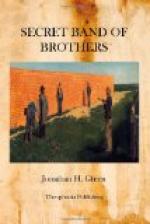The person to whom the letter was addressed must return the letter, if requested, but might keep a copy. Along this mail line lived many of the Brotherhood, and as they knew each other by signs, and were able to converse in a flash language, unintelligible to the community generally; when we recollect that they were bound by solemn oaths to aid and defend each other in every emergency, right or wrong—that both men and women belonged to the order—the reader will see what security a villain could enjoy when hunted by the police; how easily the respectable citizen, the country merchant, the lawyer, the captain of a steamboat, could conceal the fugitive, and put the officer upon the wrong scent.
In addition to this caution, any thing which must be so explicit that a stranger to the order might understand, if he should see it, was written with sympathetic ink, which would appear only when heated, and would disappear again when cold; and even this was written in a perfectly unintelligible cipher, to which, however, I very fortunately found the key among the letters. I insert it for the benefit of the curious.
One of the most profitable branches of their business was that of trading in horses. For this, as will be seen, their combination gave them peculiar facilities.
One of the common robbers steals a horse, rides it fifty or a hundred miles, and offers it to a respectable robber, called a trader. If it do not appear a dangerous bargain, he makes the transaction as public as possible; he takes a bill of sale, and enters it on his books, and the common robber goes on his way rejoicing. Presently the owner comes along, and claims the horse. The respectable trader is very much astonished at the discovery, but makes no resistance. The owner, rejoiced to find his property again, gladly pays the expenses of keeping and goes home. But the respectable trader is very sure to have not the slightest clue to the whereabouts of the man who sold him the horse, and although it was done so publicly that the owner cannot have a doubt of the innocence of the trader, yet, strange to say, nobody knows which direction the thief took, even when he left the settlement.
Lest some member should get another into his power, it is provided in the constitution, that for every transaction they shall “pass” or exchange receipts. This gives to each the same power, provided they are both of the lower grade. That is, whoever has bought a stolen horse of some member of the band, can be proved to have done so by the thief, from the receipt; and the thief in like manner is in the power of the trader. Again, it is of importance to the poor robber to have a receipt from some eminent trader, since it gives him character as a man of business, and serves as a letter of introduction. They are written in the usual form of an ordinary business transaction.
The Grand Masters, who, alone, it will be recollected, have the secret of using sympathetic ink, and the cipher, always add to the receipt, with invisible writing, the description and character of the individual who bears it, thus holding the poor fellow completely in his power.




